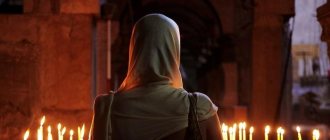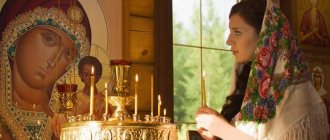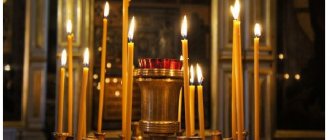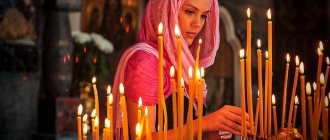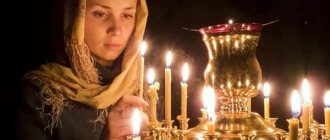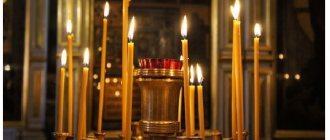Prayers are good, of course. But do non-Orthodox and non-Orthodox people have a chance to get to heaven?
What does it take to get to heaven? Keeping the commandments, that is, the Divine law. This is what the Apostle Paul says about this in his Epistle to the Romans: ... for when the Gentiles, who do not have the law, by nature do what is lawful, then, not having the law, they are a law unto themselves: they show that the work of the law is written in their hearts, as their conscience and their thoughts testify, sometimes accusing, sometimes justifying one another (Rom. 2:14-15). This means that we do not have an exact answer to this question, but everyone has hope in the mercy of the Creator.
Source of the article: https://foma.ru/kak-molitsya-ob-inoslavnyh-i-inovernyh.html
Funeral table according to Sharia - modest and ordinary
When tables are set to honor the memory of the deceased over a meal, the meal should be modest. Everyday food is served, which everyone would eat anyway, nothing extravagant: Islam simply does not prescribe any special funeral dishes (like kutia in Orthodoxy). Serving exotic and expensive dishes is completely haram.
There are two funeral tables: male and female. They should be placed in different parts of the house.
When the meal begins, it is forbidden to speak.
Missionary Prayer
God! God! Laying down Your soul for the salvation of all people! For O Lord of Thy harvest, bring forth many laborers into Thy harvest! Give to those who are exhausted the spirit of prayer, the spirit of Thy love, the spirit of humility, patience and reason. Grant them to preach the gospel with great power to fulfill your gospel.
May the desire of those who wish to help us with deeds of beneficent love be strengthened and increase, may our similar helpers multiply. Reward those who do us good with Your blessings: grant health and prosperity to the living, and give rest to those who have fallen asleep with Your saints in eternal settlements. Forgive those who hate and offend us, Lord, Lover of Mankind, enlighten their hearts, enlighten their minds. Grant to all of us, redeemed by Thy blood, those who lead and those who do not yet lead Thee, the light of reason of Thy Holy Gospel. Hasten to call and unite everyone into one Thy flock here on earth and remain with You forever, inseparable in the light of Thy Father and our God, to Him with You and the Holy Spirit be glory and power forever. Amen.
Funeral meal
Wherever the funeral takes place, the meat must be halal, i.e. allowed: chicken, beef, lamb, but not pork. Although the meat dishes themselves vary, most often they prepare dolma, goulash, fried chicken, etc. Less popular, but also allowed, are various cereals, fish dishes and side dishes. There is always a place for pilaf on the tables: both with meat and sweets, to which dried apricots, figs, and raisins are added. Among drinks, Sharia law stops alcohol in its tracks - feasts are served with honey, freshly squeezed juices, and water.
Avoid radical Muslims and... Orthodox Christians
Living in peace with everyone and being peacemakers when conflicts arise is the direct responsibility of Christians. This is our mission. I, of course, would not communicate with radically minded people, it doesn’t matter - Orthodox, Catholics, Muslims. Such people are usually very aggressive, their views are obsessive. They distort their religion, simplify everything and divide the world into “black” and “white”, “bad” and “good”. Two truly religious people belonging to different religions will try to maintain peace with each other. The sign of a truly religious person is his high morality.
Is it worth starting a conversation with non-believers about God? You can give an answer if they ask. But usually this does not happen: a believer who belongs to another faith has little interest in other religions. He has already decided on his beliefs a long time ago; you cannot try to impose yours on him. Sometimes this will look very uncivilized: in essence, you will tell a Catholic or Protestant how bad Catholics or Protestants are because they honor God and the Mother of God in one way or another, and what good Orthodox Christians are.
Funeral table in Islam
The Muslim funeral tradition has local funeral dishes that vary from country to country. There are also those that can be found almost everywhere. For example, residents of most Muslim countries eat sweets and share the belief that they grant the soul of the deceased “a sweet life with Allah.”
Sometimes a wake begins with a tea party, the sweets for which were previously placed in the same room as the deceased - then all invitees eat them. Another popular dish is broth with noodles (without vegetables). Legend has it that the steam from the broth makes it easier for the soul to rise to heaven.
Prayer to the Mother of God for the conversion of the lost, Saint Gabriel of Novgorod
Oh, All-Merciful Lady, Virgin Lady Theotokos, Queen of Heaven! By Your Nativity You saved the human race from the eternal torment of the devil: for from You Christ was born, our Savior. Look with Your mercy on this (name), deprived of God’s mercy and grace, intercede with Your Mother’s boldness and Your prayers from Your Son, Christ our God, so that He may send down His grace from above on this perishing one. O Most Blessed One! You are the hope of the unreliable, You are the salvation of the desperate, may the enemy not rejoice over his soul!
Muslim funeral according to Sharia law
Sharia - a set of moral, everyday and religious rules for the life of a Muslim - sets strict restrictions on how funerals should take place. He regulates, among other things, what dishes should be served at the funeral meal.
The main rule: for three days in the house of the deceased it is forbidden to eat anything at all. This is done so that loved ones do not think about food, but concentrate their thoughts and prayers on the deceased. It is believed that if you remember the good deeds and piety of the deceased, and pray for his soul, his path after death will become easier - and this cannot be neglected.
Orthodox pilgrim in a non-Orthodox country
Nikolai Nikolaevich Andriutsa, sexton:
The relics of St. Nicholas the Wonderworker are located in the Catholic Cathedral of the Italian city of Bari. When our pilgrim group arrived there, a Catholic wedding was taking place. And below, in the lower aisle under the main church, where the relics of the saint are kept, Orthodox priests performed the liturgy. In this chapel there are two altars - an Orthodox one, behind bars replacing the iconostasis, and a Catholic one - unobstructed. There is even ornamental painting there, similar to the painting in our churches, but without Orthodox icons. Catholics allow Orthodox Christians to serve on Thursdays.
The Orthodox Church bought a small plot next to the Catholic Cathedral. An Orthodox church and a hotel for pilgrims were built on it.
When we were in Poland, we went to the Orthodox Church of the Nativity of the Blessed Virgin Mary. They also went to Catholic churches when there was no service there. It was interesting to look at these works of Western architecture. Looking at the icons of Christ, although Catholic, we, of course, gave glory to God.
In Turkey we visited the temple in which St. Nicholas the Wonderworker served. The first temple was wooden, it burned down. Then a stone temple was built. With the invasion of conquerors, it was desecrated - eyes were gouged out from the faces, frescoes were scratched. Today they sell Orthodox icons there, there is a monument to St. Nicholas nearby, but the authorities do not allow the temple to be restored or services held there. His desecrated appearance leaves a depressing impression.
There are many Muslims in this country. These include hotel staff and tour guides. When arriving in Turkey, an Orthodox pilgrim will in one way or another come into contact with them and communicate.
Is it possible to perform namaz in church?
In my practice, I had to pray at one of the military bases in a Christian prayer room, just as there was no Muslim one and the conditions did not allow me to pray in other places. The base was so serious and I had to pray in this Kremlin, as they called it. There weren’t many images in the trailer, I chose the direction of Qibla, without images, and prayed, the place was clean. Moreover, the local priest told me that many Muslims pray here fortunately.
In such conditions of force majeure, military, as they say, in conditions of travel, especially military, you can probably pray like this, but in the conditions of a city, for a sedentary resident it is easy to go and pray in a church, scientists say that this is not necessary - makrooh.
Prayer to St. Serapion of Kozheozersk for the conversion of relatives and neighbors who profess Islam
O most wonderful and glorious, our Father Serapion! Having rejected the evil faith of your parents, and being jealous of the love of Christ, you have taken up the feats of repentance, labor and abstinence, for this sake you have appeared as a vessel of Divine grace and a partaker of the Divine nature: glorified by the Father, unconsecrated by Christ, sanctified by the Holy Spirit; In the same way, we cry out to you: ask us from the Lord for the correction of our hearts, so that we can learn to do the will of the Most High God and love the Kingdom of Heaven more than earthly goods, and may our neighbors and relatives in the flesh, through your prayerful intercession, lead the All-Merciful Lord out of the darkness of the disastrous Hagarian delusion may he enlighten with the light of true faith, may he be considered holy by His Church, may he guide him on the path of righteousness, to whom honor and worship befits the Father and the Son and the Holy Spirit, now and ever and unto ages of ages,
On what day after death is it commemorated?
For the first 3 days after the death of a Muslim, condolences (tazia) are expressed to the family. At this time, they must read the Koran and distribute sadaka (scarves, sweets or money). There is no need to offer condolences more than once. It is forbidden to stay overnight in a house if a tazia is being held there.
On the day of the funeral, a memorial meal is held in the house of the deceased. During the wake, they talk quietly, remember good things about the deceased, and read the Koran. It is not allowed to loudly and immoderately express one’s grief for the deceased, to sob and scream. You can't drink alcohol. There is no need to put a photo of the deceased and a device for him.
Often the period of mourning is extended by 40 days. At this time, it is unacceptable to attend entertainment events or watch TV. Men often don't shave as a sign of grief. After this time, you can open the mirrors, the ban on visiting shows and entertainment is lifted, and life gradually returns to its groove.
Is it a sin for a Christian to study the Koran?
I wouldn’t read religious books of other people’s traditions out of idle interest either. We often do not have time to read our Holy Scriptures or the works of the Holy Fathers. If I had free time, I would spend it reading Orthodox literature. Priests get acquainted with the works of Western Christian theologians - Clive Staples Lewis, Michael Kunzler - for educational purposes, but this is more literature for specialists in one or another field of theology.
There is no sin in taking a Catholic icon or cross out of politeness if someone gave it to you. Such items can then be brought to a Catholic church and left there. Even if you keep them at home, it’s okay. There are also many non-canonical images in our churches, especially on the frescoes of the 18th-19th centuries, which were painted under the influence of Western tradition.
When in another country, I would not try foods that are associated with foreign religious customs, such as matzah in Israel, or pick up any religious items offered, such as Jewish prayers handed out on Israeli buses for the road. At the same time, you need to behave civilly so as not to offend anyone. Even if someone behaves disrespectfully towards us, this is their problem, not ours, there is no need to respond in kind.
Is it possible to go to church?
According to the majority of ulama - theologians of Sunni schools, a Muslim can enter the church. The fact that the church is God's house is indicated by the verses of the Holy Quran, which prohibit the destruction of property, buildings such as churches, synagogues, as well as mosques, they go on almost the same level, for, indeed, Jews and Christians are the owners of the Scriptures. Therefore, in their prayers there is, alhamdulillah, truth, but in which prayers we cannot now say, for we do not reject and do not consider the Last Truth to be what is in their prayers. So, we believe that the only Scripture that has not been changed is the Holy Quran.
But in the same church dogmas that contradict the Koran and Sunnah, we see something that is not sent down from God, but introduced by people, but, undoubtedly, this is in the modern world, this is the worship of the cross, when they believe that the cross is a divine symbol, then we do not consider it a divine symbol. Moreover, there is a tradition from the prophet (PBUH) that this is not a good symbol and also prayers addressed to the faces of certain, as the Orthodox say, “written icons.”
We believe that these are images and do not believe that these images should be worshiped, and we do not see any essence in them, because even historically it so happened that we can trace when they appeared in early Christianity, especially in the earlier one among the followers of Monotheism, from Isa (alaihi ssalaam) there were no such signs, even Christian theologians say that there were other signs: a dove, a fish and others. That is why a Muslim should know that in the Christian church there are these symbols that the peasants worship, we do not worship them, and based on this, the main opinion is that it is undesirable and not advisable to go there specifically for prayer - makruh.
Prayer by agreement
Lord Jesus Christ, Son of God, Thou hast spoken with Thy most pure lips: Amen, I say unto you, For if two of you take counsel on earth concerning every thing which thou askest, it shall be received from My Father who is in heaven: for where there are two or three gatherings in My name I am in the midst of them. Thy words are immutable, O Lord, Thy mercy is unconditional and Thy love for mankind has no end. For this reason, we pray to Thee: grant to us, Thy servants (names), who have agreed to ask Thee to turn to the Light of Thy knowledge from the darkness of the Hagaran evil-belief of Thy servants (names). We ask You to fulfill our request. But not as we want, but as You want. Thy will be done forever. Amen.
01/24/2013 15:19:05 Vasilisa, Saratov
Hello!
Is it possible to get married on May 10 or 11, 2013? 01/23/2013 18:24:00
Anastasia Moscow Hello!
Please tell me is it possible to get married on Friday the 13th? 01/18/2013 13:59:51
When was Palm Sunday in 1929?
01/17/2013 18:31:45
Elena, Ulyanovsk Please tell me, is it possible to make a memorial table for the Presentation of the Lord?
February 15 - 40 days. 01/16/2013 0:29:01
Oleg……Moscow Hello Father.
Help me resolve my doubts... In Ukraine there appeared this kind of Orthodox healer Viktor Gromov, he himself suffers from cerebral palsy, he seems to be a churchgoer who accepts and heals people. Many go to him and receive healing. My family and I also really want to get to him, but I am tormented by doubts whether we can do this, how the Orthodox Church treats Viktor Gromov. ...With respect, servant of God Oleg. 01/13/2013 20:21:55
Elena, Tatarstan, Bavlinsky district, Krym-Saray village Hello!
February 15, 2013 (Friday) will be 2 years since the death of my dad. Should the funeral table be fast or not? 01/10/2013 11:46:46
Ekaterina, Belarus Hello, please tell me, my fiancé and I are signing at the registry office on February 15, 2013, and they told me that this is the Presentation of the Lord and that it is forbidden on this day, I don’t know what to do, does the church allow painting on this day, even if it’s a holiday according to the church calendar (we won’t have any fun, just painting with witnesses at the registry office)
01/09/2013 19:01:51
Please name the date of the celebration of the Entry of the Lord into Jerusalem (Palm Sunday) in 1932.
Thanks in advance for your answer. 01/09/2013 16:01:04
Sasha.Lyubar.Ukraine Is it possible to bury a person on the first day of Christmas?
01/08/2013 13:16:04
Elena Sumy Hello!
Please tell me on what day after Christmas can I sew, knit, wash. And is it possible to knit on Christmastide? 01/07/2013 19:57:13
Vladimir Hello, please tell me, is it possible to shave on Christmas Day, January 7th?
01/06/2013 21:32:09
Yuri. Lutsk. Ukraine Hello!
Please tell me whether it is allowed to cut hair on Christmas 01/06/2013 14:02:34
Nina, Tula, Russia It is necessary to visit the cemetery on the twentieth day of the husband’s death, if this day falls on the Nativity of Christ.
01/05/2013 14:02:20
Nadezhda.city of Lipetsk.Russia. Tell me, please. Is it possible to move to a new apartment in winter on January 18?
01/04/2013 15:59:10
Irina Saratov My mother died on 11/29/12.
40 days fall on Christmas Day 01/07/13. Please tell me how to conduct a funeral correctly, on what date should you order a service in the church, on what date is it better to have a funeral dinner? Total entries 2572 | 1 >>
What to do when a Muslim is dying
The dying person must be placed on his right side, facing towards the Qibla. Qibla (“orientation”) is the direction of the holy Kaaba, the main Muslim shrine, it is located in the courtyard of the Forbidden Mosque (Masjid al-Haram) in Mecca. It is permissible to place the dying person's feet towards Mecca and raise his head.
If for some reason it is not possible to place a person in the direction of Qibla (or it is impossible to establish him), place him in a way that is comfortable.
The last thing a believer must say before death is the Shahada (“There is no god but Allah, and Muhammad is his prophet”). If the dying person cannot speak, then a fellow believer nearby whispers a prayer in his ear. After the words of the Shahada, a Muslim should not say anything more. Some peoples have a custom of giving a person a sip of clean water (or a little pomegranate juice) before death.
Then the 36th sura (Ya Sin), which the prophet called “the heart of the Koran,” is read over the dying person. Theologians attach great importance to this surah. It is believed that if you read it at the time of death and at a funeral, it will ease the fate of the deceased and even soften the interrogation on Judgment Day.
Those who are present at the last minutes of a person are forbidden to behave inappropriately: sob loudly, beat themselves in the chest, tear their clothes. You should even talk in a low voice.
People get to know Orthodoxy through us
Archpriest Vadim Morozov:
It is possible to communicate with any person. It is not necessary to delve into theological topics. Each person has their own individual experience of faith. Under no circumstances should you compare it with your own or offer or impose your own.
Orthodoxy is not only liturgy, liturgical books and the works of the holy fathers. This is the perception of the world and people. Looking at us, a non-Christian will still get acquainted with Orthodoxy in one way or another.
It happens that a Protestant or Catholic offers to pray together about something. An Orthodox person cannot pray with him. You can raise the topic of prayer, ask how he prays, tell how we pray, and then say: can we do this together if I pray this way and understand prayer, and you do it differently? He may understand this himself. Muslims don’t offer us a rug and start bowing towards Mecca? But in order to answer this way, an Orthodox person, in addition to faith, needs to have theological knowledge. We must be able to justify our beliefs and give an answer about our faith if asked.
If a non-Christian brings up in a conversation something that he does not accept in our faith - for example, the veneration of the Mother of God, this is unpleasant for me, and I will say: “Let’s not talk about it!” It is not our prerogative to condemn him. There is a Judge who will judge everyone. I’m not, you know, a jaded Orthodox who shouts to all the non-Orthodox: “You are sinners and will not be saved!”
Not everyone is spiritually benefited from communicating with people of other faiths. After all, many often look for negativity even in the priest of their parish, in fellow believers with whom they pray together during divine services, because we ourselves have a lot of negativity. Anything that goes wrong, we rush to condemn: “But that’s how he is! And that’s what he did wrong!” But we don’t notice the good in people. Imagine what will happen if we apply the same approach to a non-Christian...
Should Christians Pray for Muslims?
Telegram channel @ieshua.org
Last week, Muslims around the world began the holy month of Ramadan. This period of strict fasting and prayer lasts about thirty days. People abstain from food, drink and other pleasures from sunrise to sunset in order to cleanse the body and turn all attention to spiritual needs. Ramadan is one of the five pillars of Islam that are common to all Muslims, but it is also a time when Christians pray for the Islamic world, asking God to reveal the truth about Jesus Christ to Muslims.
“During this period, we must pray that God - the God of the Bible - will open the eyes of Muslims during their prayer for God's favor and actually give it to them, that is, reveal the Gospel of Jesus Christ to Muslims. I think that in many ways the violence that we see in the Middle East is a physical manifestation of the spiritual struggle for the souls of people in the Muslim world. So this is an extremely important month to pray for Muslims and serve people in the Muslim world,” says author Joel Rosenberg. CBN-News spoke with Joel about the unprecedented move of God in the Muslim world and discussed the reasons behind it.
MHN: Joel, in your blog JoelRosenberg.com you cite research showing that more Muslims came to Christ between the 1960s and the 2010s than in any other period in history. Tell us why.
Joel Rosenberg: Interesting question, isn't it? We went from less than two hundred thousand Muslim converts to Christianity in 1960 to more than 10 million by 2010. It's been six years since then, and we think the trend is growing.
Look how much has happened in the last 50 years in the Middle East: revolutions, wars, upheavals, impoverishment. And I think that especially over the last 10 or 15 years, many Muslims have become increasingly disillusioned with Islam and its representatives like ISIS or the Iranian leadership or Assad. Many Muslims say: “If this is Islam, if this is real Islam, then I renounce it, it does not suit me.” And they start looking. They experience so much sadness, pain and hardship that they begin to doubt the truth of the system they have always known and accepted.
MHN: Do Muslims feel disillusioned with Islam?
Yes, and even very much so. Moreover, over the past few decades throughout the Islamic world, those scholars of Islam who have not yet converted to Christianity have been asking the question, “What went wrong?” In the past, the Islamic world had military power and was at the forefront of science and technology, culture and art, and architecture. But now you won't see any Nobel Prize or Pulitzer Prize winners among Muslims. You won't see them making high-tech discoveries. You will only see oil and war. And this is accompanied by poverty and illiteracy. And Muslims ask: “What happened to us? If God is with us, then why do we suffer so much?” And they react to it differently. Some Muslims say: “God is not with us, and we must become more radical, aggressive and commit jihad” - a holy war. But others say: “No, no. Maybe we are the ones who are wrong.” And they begin to look for information on satellite television, on the Internet, on the radio and from other believers with whom they somehow encounter. They also have dreams and visions about Christ. God is bringing the gospel message to Muslims in many ways, bypassing the clergy and government officials, while Muslims are going through such a big upheaval in consciousness and introspection.
MHN: Would you agree with the statement that there are also more opportunities for ministry in the Muslim world now than ever before?
I think yes. Although, in my opinion, in many ways all this intensified after September 11. In other words, when radical Islam attacked the United States, there was a reaction. Obviously, when we went to war against them, a new reaction followed. Many Americans, and Christians in general, are very angry at Islam. But others began to say: “Listen, what makes them hate us so much? Perhaps we—as the church in general and the American church in particular—are neglecting opportunities to convey to them the Good News that there is hope, that there is salvation, that no one should destroy themselves? Some have already died so that our sins can be forgiven.” And so I think there needs to be an increase in mission work in the Muslim world using new technologies that would allow even fewer people to reach even more people with the Gospel. In my opinion, not enough people are yet engaged in evangelism among Muslims. I think this is still our weak point, but I also believe that God moves very powerfully using dreams and visions. In them, Muslims see the Man in White, Jesus Christ Himself. And they begin to seek Him - even when the church is not ready to preach to them. And now all these factors converge at one point, which leads, in my opinion, to enormous spiritual openness among Muslims. Recently, data has been coming in confirming what we all already felt: there is a huge wave of Muslims who are turning to Christ. But again, remember, there are now ten million converts, and even if there are, say, twice as many, that is, 20 million, then given the fact that there are over one and a half billion Muslims in the world, we still have a long way to go. Therefore, if we want to fulfill the Great Commission and take the Good News to every nation, to disciple all nations, then we must move to a new level of ministry, be much more faithful in preaching and strengthen pastors and ministry leaders in the region so that they can bring the Gospel to their people.
By the way, Joel also spoke about the brutal persecution of Christians in the Muslim world and how they even strengthen the church. Visit cbnnews.com to hear more about this.
The 30 Days of Prayer for the Muslim World website also provides resources on Islam, tips on how to pray for Muslims, and testimonies about the power of prayer to change lives in the Middle East.
Source - MHN
Donate Last: 02/28. Thank you!
Subscribe: Telegram • Facebook • • • Twitter • Instagram • Youtube
More on the topic:
- It Was Worth a Thousand Years of Waiting: The Incredible Growth of the Church in Iran
- How to Pray for Afghanistan and the Taliban
- Rejected for Jesus: What I Lost and Gained in Christ
- American Missionary Persecuted by ISIS: “Jesus Himself Appears to Many Muslims”

